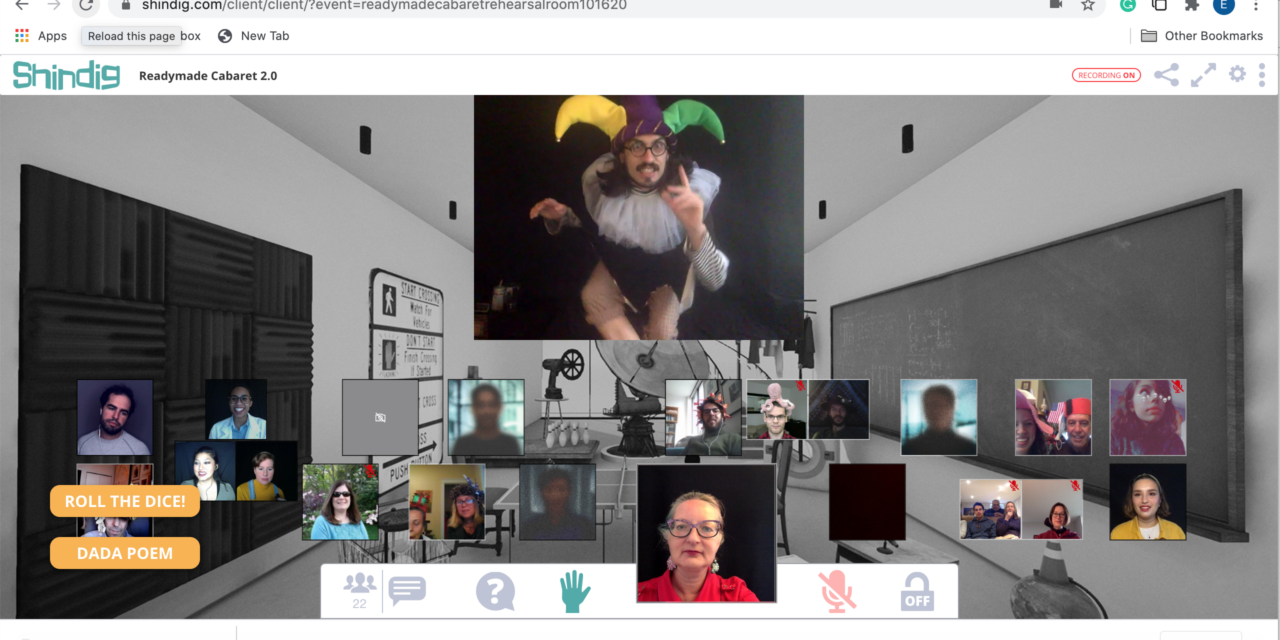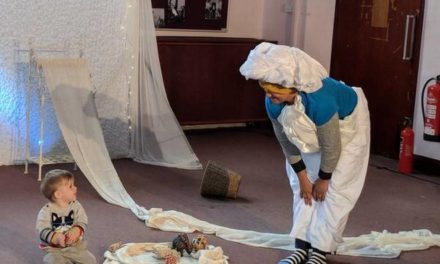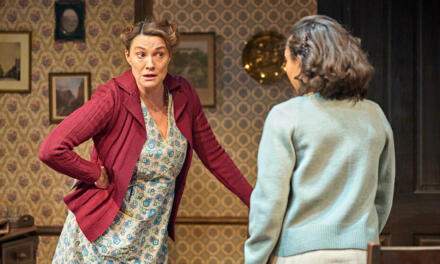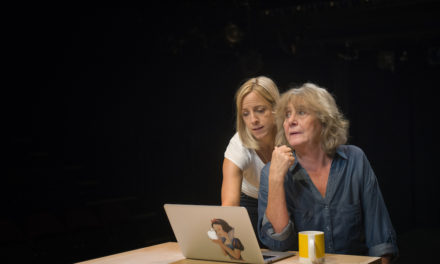Launched simultaneously at the Cabaret Voltaire in Zürich, Switzerland and out of the art scene of New York City in the early 20th century, Dada was a post World War I phenomenon. In This is Not a Theatre Company’s Readymade Cabaret 2.0, 21st-century Dada artists continue to give ascent to new and revolutionary ways of thinking. Conceived and Directed by Erin B. Mee and written by Jessie Bear, the play builds upon this cultural movement, which took aim at not only the establishment, but also at art itself. Artists expressed their discontent towards the status quo by creating avant-garde performance art and poetry in reaction to World War I. Everyday objects were exhibited as art. Had the world gone mad?
Performed on Shindig and based on Marcel Duchamp’s notions of readymade art and the philosophies of Dada as practiced by Tristan Tzara, the interactive online performance breaks out of linear time, sparking a new wave of Dada performance art that has over a million possible outcomes. Character-based scenes are juxtaposed with computer-generated Dada poetry, computer-generated Dada art, audience-created aleatory music, and Chance Dances created by audience prompts typed into the chat.
Built upon the free thinkers and art rebels who defied convention, Readymade Cabaret 2.0 calls for artist and audience to step into a more emphasized way of dealing with the world. Erin B. Mee sets forth principles and aims to bring fulfillment to a noble action:
“Greek tragedy was built on competition. It was built on Agon. It was built on conflict. She continued, adding “If we are going to fix the things that are wrong with our society, we need new dramaturgical structures for theatre that create new ways of thinking about the world and new modes of engagement that allow us to practice different modes that we are not conquering or oppressing other species or each other—that we are collaborating, transforming et cetera.”
The Friday, November 13th performance added another level of mystique to the experience. Featuring actors Karen Green, Marisa LaRuffa, Beatrice Antonie Martino, Jonathan Matthews, Chris Morriss, and Lipica Shah, the play celebrates the beauty of chance encounters. Sandwiched between Readymade Opening and Closing speeches, written by Ezra Brain and performed by Erin B. Mee—the master of ceremony—the scenes emerged. The audience members step up to the virtual podium to roll the dice to determine the orders in which the 27 scenes or films play out. When a drama is selected, the cast performs scenes live. Some are scripted. Others are unscripted. The scenes ranged from: No. 2 “Amy Does Believe in Fate” to No. 14 “Readymade #2: What is Dada?” to No. 11 “Aleatory Composition II” to No. 8 “Lab Rats” to No. 24 “Chance Dance III.”
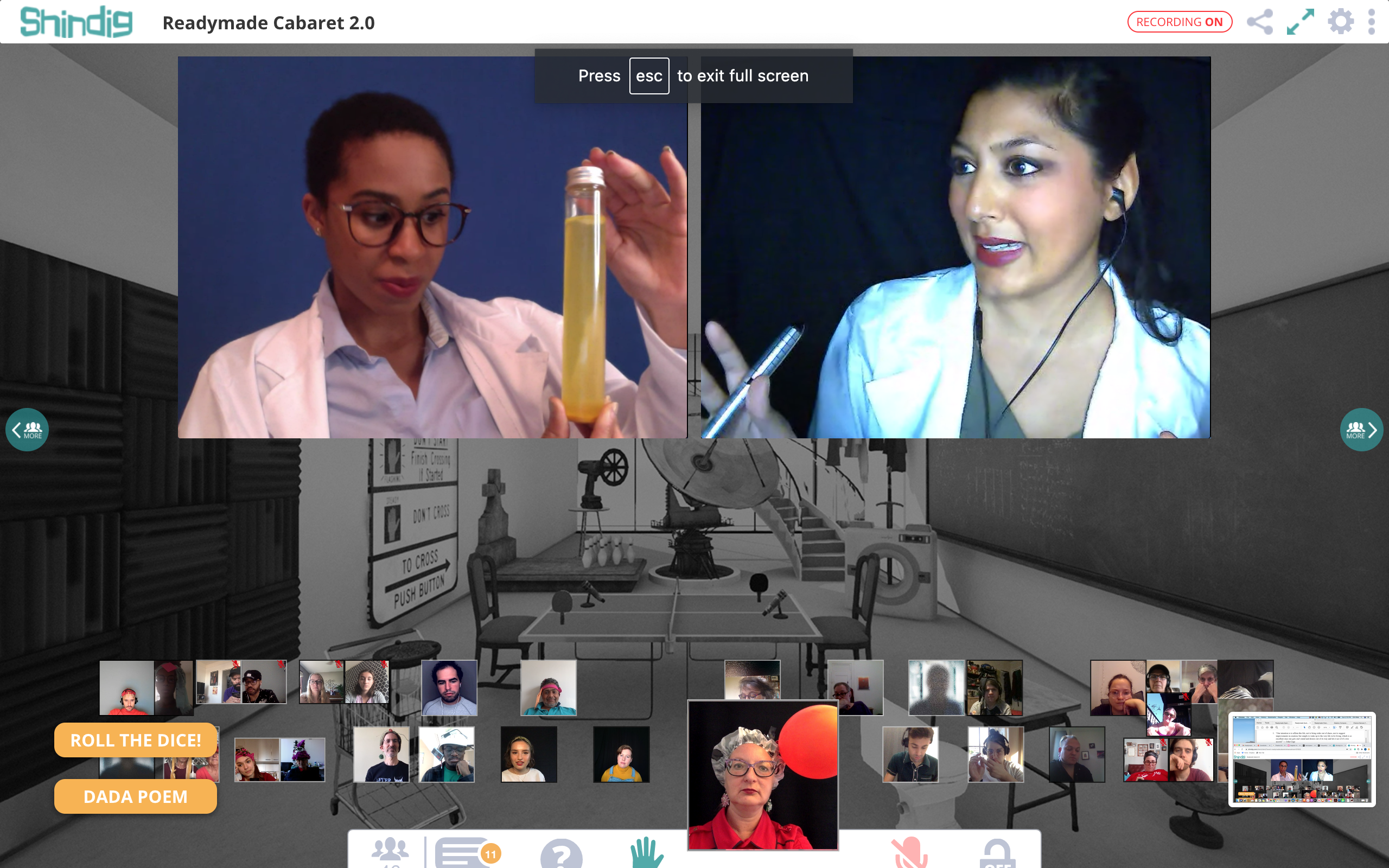
This is Not a Theatre Company’s Readymade Cabaret 2.0.
Jonathan Matthews and Beatrice Antonie Martino performed Chance Dances in lively court jester threads. The aleatory compositions created vis-à-vis audience prompts were especially memorable. In the Aleatory Musician role, Matthewsemploys the contrivances of cheese grater or coffee percolator to create a soundscape unlike any other. When prompted by the MC, audience members were asked to type responses into the chat, such as “name as a body part, a mechanical action, and a number one through ten. “Ear, Turn, 4,” “Hip, Thrust, 10,” “Ear, Shake, 5,” and “Heart, Drill, 9” were some of the prompts that animated Martino’s character. An atmosphere of in-the moment whiplash ensued.
Readymade Cabaret 2.0 is This is Not a Theatre Company’s fourth online theatre piece. Mee recounts the time when the idea was born at ITP camp, an Interactive Telecommunications Program at NYU.
“Okay this is it. We are going to combine Readymade Cabaret with the current political, and social, and medical moment with these computer programmer artists. We are going to make this a fun online multi-media theatre piece.” She continued, adding, “The online platform allows us to have audiences from all around the world. The other night, our opening performance, we had a friend of mine from Moscow. Several performances of this run are part of the Melbourne Fringe Festival. It allows us to kind of travel internationally in an interesting way.”
Audience members co create and employ chance happenings as an instrument to make the meaning. Some elements of the production remain fixed versus those, which play out according the laws of chance. No two performances are alike. The live-performed scenes and projection installation videos are stand-alone art pieces in themselves. Methods of expression ranged from the serious and earnest to the zany and ridiculous.
Before becoming an actor and filmmaker, Beatrice Antonie Martino started out as a dancer and performer. She loves creating installations for people in real space. Her challenge for this project was to create a whole new experience by transforming her projection installation pieces into video art. Martino gives us a fleeting glimpse on process.
“What I love about projection is how it can animate space in a kind of different way and create these disembodied illusions and make the space come alive in more interesting ways.” She continued, adding, “How to do I video a projection installation? How do I make art out of that? And how many steps removed can I go with the technology to a make a whole other experience out of it where it’s not trying to emulate you being in the space? It is actually creating a whole other dimension.”
Mee gives us a new perspective on notions of linearity and linear time:
“We have a notion of timelines. And this implies that time constantly moves forward; and this implies progress. I would argue in 2020 that progress is up for discussion. It is no longer inevitable, right? She continued, adding: “The Dada artists argued that if notions of progress and improvement ended up in World War I, the greatest, most destructive war they had experienced until that moment, then what good was progress? What good was linear thinking? What good was a dramaturgical structure that seemed to go from beginning to middle to end?”
Mee comments on through-line of action and spells out why emotion is most assuredly a necessary element:
“Perhaps we have to invest in the Sanskrit notion of Rasa In which one relishes emotion, right? And so one savors particular artistic moments to create a relishing of an artistic event so that we can rethink all of the structures that have led us to these moments in 2020. So to me, the artistic and the political are deeply embedded in each other … One of the things that online theatre is allowing us to do is connect with people around the world,” expounded Mee.
Readymade Cabaret 2.0, the play has the potential to trigger a new wave of Dada performance art—one that renounces artistic norms. The brilliant performance reaffirms its disregard for conventional attitudes and unjustified inequalities—a nod to the social and political context from which the work sprang. Mee points out this notion:
“I think that an Aristotelian dramaturgical structure in which character A and character B get into a conflict and they resolve that conflict and there is a linear progression from A to B to C to D to E to F to a moment of catharsis and a then a denouement, which is as you know Luce Irigaray said is a dramaturgical structure built on the male orgasm.” On the philosophy of rejecting linear storytelling, she continued, adding: “Dada artists were calling all of that into question.”
Why is Dada relevant 100 plus years later, you ask? The performance speaks to the current COVID moment by asking whether our lives are determined by chance, fate, or free will. On embracing a new paradigm of reality, Mee gives an explanation:
“To me one of the things that this Pandemic is teaching us is that many of our ways of thinking and modes of operating are problematic and that we need to invent new structures. And I would say social structures and I would also say artistic structures and new economic structures. She continued, adding “Particularly in the United States, the systemic racism, the inequality, has been highlighted I think by COVID. And I would also say Climate Change—our relationship to other species on the planet. We need to really rethink this.”
Other proud members of the legacy of Dada include Evangeline Whtilock, Bradley Costa, and Kelly Kirby of Stage Management; Karina Gutierrez, Costume Design; Dyan Jong, Computer-Generated Dada Backgrounds; Brent Bailey, Computer Generated Dada Poetry, and Beatrice Antonie Martino, Readymade Films.
Does art have the potential to improve human development so that it can flourish? Are there themes of social consciousness at work here? Was Dada designed expressively for that purpose? In a time of great uncertainty, artists and audiences continue to embrace Dada philosophies—a measure on how things are moving forward. Erin B. Mee’s play is thoroughly entertaining, thought provoking, and downright fun. Readymade Cabaret 2.0 “asks the audience to perceive the world in new ways, to empathize in new ways, and practice creativity.”
The performance runs through December 6, 2020.
Artistic Director, Erin B. Mee is an Arts Professor in the Drama Department at Tisch School of the Arts at NYU. This Is Not A Theatre Company prides itself as the dance-theatre that can be eaten, touched, smelled as well as seen and heard. For all the delicious details drop by www.thisisnotatheatrecompany.com
This post was written by the author in their personal capacity.The opinions expressed in this article are the author’s own and do not reflect the view of The Theatre Times, their staff or collaborators.
This post was written by Alexander Fatouros.
The views expressed here belong to the author and do not necessarily reflect our views and opinions.

